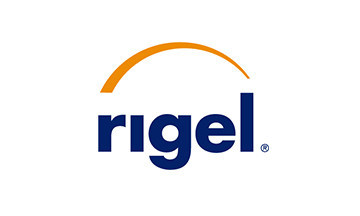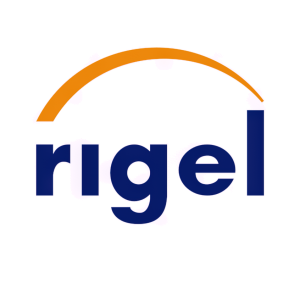Rigel Announces First Patient Enrolled in Phase 1b/2 Triplet Therapy Trial of REZLIDHIA® (olutasidenib) in mIDH1 AML
Rhea-AI Summary
Rigel Pharmaceuticals (Nasdaq: RIGL) has announced the enrollment of the first patient in a Phase 1b/2 triplet therapy trial combining REZLIDHIA® (olutasidenib) with decitabine and venetoclax for mutated isocitrate dehydrogenase-1 (mIDH1) acute myeloid leukemia (AML). This trial, conducted in partnership with MD Anderson Cancer Center, marks the beginning of Rigel's strategic development alliance. The study aims to evaluate the safety, tolerability, and efficacy of this combination in both newly diagnosed and relapsed/refractory mIDH1 AML patients. REZLIDHIA is an oral, small-molecule inhibitor of mIDH1, already approved for relapsed or refractory mIDH1 AML. The trial's primary objective is to determine complete remission rates in 60 patients across two cohorts.
Positive
- First patient enrolled in Phase 1b/2 triplet therapy trial for mIDH1 AML
- Strategic development alliance with MD Anderson Cancer Center initiated
- Potential for REZLIDHIA to be used in combination therapy for front-line AML treatment
- Expansion of REZLIDHIA's potential applications in various hematologic neoplasms
Negative
- Potential for differentiation syndrome, which can be fatal, with REZLIDHIA treatment
- Risk of hepatotoxicity associated with REZLIDHIA use
- Possible drug interactions with CYP3A inducers and substrates
News Market Reaction
On the day this news was published, RIGL gained 1.75%, reflecting a mild positive market reaction.
Data tracked by StockTitan Argus on the day of publication.
- First trial in Rigel's multi-year strategic development alliance with MD Anderson
- Phase 1b/2 trial of decitabine and venetoclax in combination with Rigel's targeted mIDH1 inhibitor REZLIDHIA for patients with mIDH1 AML
The clinical trial is sponsored and is being conducted by The University of Texas MD Anderson Cancer Center (MD Anderson) and opened for enrollment in August (NCT06445959). The trial is led by principal investigator Courtney DiNardo, M.D., MSCE, Professor of Leukemia at MD Anderson. It is a multi-center, open-label, non-randomized clinical trial, with the Phase 1b part of the trial seeking to determine the safety and tolerability and recommended Phase 2 dose of oral or intravenous (IV) decitabine and venetoclax in combination with olutasidenib in mIDH1 R/R patients. The Phase 2 part of the trial will include 60 patients and its primary objective is to determine the complete remission rate in both newly diagnosed (n=30) and R/R mIDH1 AML patients (n=30). This is the first trial in Rigel's multi-year strategic development alliance with MD Anderson.
"We believe REZLIDHIA has strong potential in a wide range of cancers where mIDH1 plays an important role. Studying REZLIDHIA in combination with two widely used agents in AML could provide a new all-oral front-line option to patients who are in urgent need of innovative treatments," said Raul Rodriguez, Rigel's president and CEO. "MD Anderson is the ideal partner on this journey to evaluate REZLIDHIA's impact on AML and other hematological cancers. We are excited to have the first patient enrolled in this initial trial in mIDH1 AML."
As part of the strategic alliance with MD Anderson related to IDH1 mutated hematologic neoplasms, Rigel and MD Anderson will evaluate the potential of olutasidenib in combination with other agents to treat newly diagnosed and R/R patients with AML, higher-risk myelodysplastic syndromes (MDS) and advanced myeloproliferative neoplasms (MPN). The alliance will also support the evaluation of olutasidenib as monotherapy in clonal cytopenia of undetermined significance (CCUS), lower-risk MDS and as maintenance therapy in post-hematopoietic stem cell transplant patients.
About AML
Acute myeloid leukemia (AML) is a rapidly progressing cancer of the blood and bone marrow that affects myeloid cells, which normally develop into various types of mature blood cells. AML occurs primarily in adults and accounts for about 1 percent of all adult cancers. The American Cancer Society estimates that there will be about 20,800 new cases in
Relapsed AML affects about half of all patients who, following treatment and remission, experience a return of leukemia cells in the bone marrow.3 Refractory AML, which affects between 10 and 40 percent of newly diagnosed patients, occurs when a patient fails to achieve remission even after intensive treatment.4 Quality of life declines for patients with each successive line of treatment for AML, and well-tolerated treatments in relapsed or refractory disease remain an unmet need.
About REZLIDHIA®
INDICATION
REZLIDHIA is indicated for the treatment of adult patients with relapsed or refractory acute myeloid leukemia (AML) with a susceptible isocitrate dehydrogenase-1 (IDH1) mutation as detected by an FDA-approved test.
IMPORTANT SAFETY INFORMATION
WARNING: DIFFERENTIATION SYNDROME Differentiation syndrome, which can be fatal, can occur with REZLIDHIA treatment. Symptoms may include dyspnea, pulmonary infiltrates/pleuropericardial effusion, kidney injury, hypotension, fever, and weight gain. If differentiation syndrome is suspected, withhold REZLIDHIA and initiate treatment with corticosteroids and hemodynamic monitoring until symptom resolution. |
WARNINGS AND PRECAUTIONS
Differentiation Syndrome
REZLIDHIA can cause differentiation syndrome. In the clinical trial of REZLIDHIA in patients with relapsed or refractory AML, differentiation syndrome occurred in
If differentiation syndrome is suspected, temporarily withhold REZLIDHIA and initiate systemic corticosteroids (e.g., dexamethasone 10 mg IV every 12 hours) for a minimum of 3 days and until resolution of signs and symptoms. If concomitant leukocytosis is observed, initiate treatment with hydroxyurea, as clinically indicated. Taper corticosteroids and hydroxyurea after resolution of symptoms. Differentiation syndrome may recur with premature discontinuation of corticosteroids and/or hydroxyurea treatment. Institute supportive measures and hemodynamic monitoring until improvement; withhold dose of REZLIDHIA and consider dose reduction based on recurrence.
Hepatotoxicity
REZLIDHIA can cause hepatotoxicity, presenting as increased alanine aminotransferase (ALT), increased aspartate aminotransferase (AST), increased blood alkaline phosphatase, and/or elevated bilirubin. Of 153 patients with relapsed or refractory AML who received REZLIDHIA, hepatotoxicity occurred in
Monitor patients frequently for clinical symptoms of hepatic dysfunction such as fatigue, anorexia, right upper abdominal discomfort, dark urine, or jaundice. Obtain baseline liver function tests prior to initiation of REZLIDHIA, at least once weekly for the first two months, once every other week for the third month, once in the fourth month, and once every other month for the duration of therapy. If hepatic dysfunction occurs, withhold, reduce, or permanently discontinue REZLIDHIA based on recurrence/severity.
ADVERSE REACTIONS
The most common (≥
DRUG INTERACTIONS
- Avoid concomitant use of REZLIDHIA with strong or moderate CYP3A inducers.
- Avoid concomitant use of REZLIDHIA with sensitive CYP3A substrates unless otherwise instructed in the substrates prescribing information. If concomitant use is unavoidable, monitor patients for loss of therapeutic effect of these drugs.
LACTATION
Advise women not to breastfeed during treatment with REZLIDHIA and for 2 weeks after the last dose.
GERIATRIC USE
No overall differences in effectiveness were observed between patients 65 years and older and younger patients. Compared to patients younger than 65 years of age, an increase in incidence of hepatotoxicity and hypertension was observed in patients ≥65 years of age.
HEPATIC IMPAIRMENT
In patients with mild or moderate hepatic impairment, closely monitor for increased probability of differentiation syndrome.
Click here for Full Prescribing Information, including Boxed WARNING.
To report side effects of prescription drugs to the FDA, visit www.fda.gov/medwatch or call 1-800-FDA-1088 (800-332-1088).
REZLIDHIA is a registered trademark of Rigel Pharmaceuticals, Inc.
About Rigel
Rigel Pharmaceuticals, Inc. (Nasdaq: RIGL) is a biotechnology company dedicated to discovering, developing and providing novel therapies that significantly improve the lives of patients with hematologic disorders and cancer. Founded in 1996, Rigel is based in
- de Botton S, et al. Olutasidenib (FT-2102) induces durable complete remissions in patients with relapsed or refractory IDH1-mutated AML. Blood Advances. February 1, 2023.
doi: https://doi.org/10.1182/bloodadvances.2022009411 - The American Cancer Society. Key Statistics for Acute Myeloid Leukemia (AML). Revised June 5, 2024. Accessed June 30, 2024: https://www.cancer.org/cancer/acute-myeloid-leukemia/about/key-statistics.html
- Leukaemia Care. Relapse in Acute Myeloid Leukaemia (AML). Version 3. Reviewed October 2021. Accessed June 30, 2024: https://media.leukaemiacare.org.uk/wp-content/uploads/Relapse-in-Acute-Myeloid-Leukaemia-AML-Web-Version.pdf
- Thol F, Schlenk RF, Heuser M, Ganser A. How I treat refractory and early relapsed acute myeloid leukemia. Blood (2015) 126 (3): 319-27. Accessed June 30, 2024. doi: https://doi.org/10.1182/blood-2014-10-551911
Forward-Looking Statements
This press release contains forward-looking statements relating to, among other things, the potential of REZLIDHIA (olutasidenib), both as a monotherapy and in combination with other agents, as a therapeutic for R/R AML and the potential of REZLIDHIA as a therapy for a broad range of mIDH1 cancers including higher-risk myelodysplastic syndromes (MDS), advanced myeloproliferative neoplasms (MPN), clonal cytopenia of undetermined significance (CCUS), lower-risk MDS and as maintenance therapy in post-hematopoietic stem cell transplant patients, and the benefits of Rigel's collaboration with MD Anderson Cancer Center. Any statements contained in this press release that are not statements of historical fact may be deemed to be forward-looking statements. Forward-looking statements can be identified by words such as "potential", "may", "will" and similar expressions in reference to future periods. Forward-looking statements are neither historical facts nor assurances of future performance. Instead, they are based on Rigel's current beliefs, expectations, and assumptions and hence they inherently involve significant risks and uncertainties and are subject to changes in circumstances that are difficult to predict and many of which are outside of our control. Therefore, you should not rely on any of these forward-looking statements. Actual results and the timing of events could differ materially from those anticipated in such forward looking statements as a result of these risks and uncertainties, which include, without limitation, the risks and uncertainties of clinical trials and drug development; risks and uncertainties of commercialization and marketing of olutasidenib; risks that the FDA, European Medicines Agency, PMDA or other regulatory authorities may make adverse decisions regarding olutasidenib; risks that clinical trials may not be predictive of real-world results or of results in subsequent clinical trials; risks that olutasidenib may have unintended side effects, adverse reactions or incidents of misuse; the availability of resources to develop Rigel's product candidates; market competition; as well as other risks detailed from time to time in Rigel's reports filed with the Securities and Exchange Commission, including its Quarterly Report on Form 10-Q for the quarter ended June 30, 2024 and subsequent filings. Any forward-looking statement made by us in this press release is based only on information currently available to us and speaks only as of the date on which it is made. Rigel does not undertake any obligation to update forward-looking statements, whether written or oral, that may be made from time to time, whether as a result of new information, future developments or otherwise, and expressly disclaims any obligation or undertaking to release publicly any updates or revisions to any forward-looking statements contained herein, except as required by law.
Contact for Investors & Media:
Investors:
Rigel Pharmaceuticals, Inc.
650.624.1232
ir@rigel.com
Media:
David Rosen
Argot Partners
212.600.1902
david.rosen@argotpartners.com
![]() View original content to download multimedia:https://www.prnewswire.com/news-releases/rigel-announces-first-patient-enrolled-in-phase-1b2-triplet-therapy-trial-of-rezlidhia-olutasidenib-in-midh1-aml-302238788.html
View original content to download multimedia:https://www.prnewswire.com/news-releases/rigel-announces-first-patient-enrolled-in-phase-1b2-triplet-therapy-trial-of-rezlidhia-olutasidenib-in-midh1-aml-302238788.html
SOURCE Rigel Pharmaceuticals, Inc.








